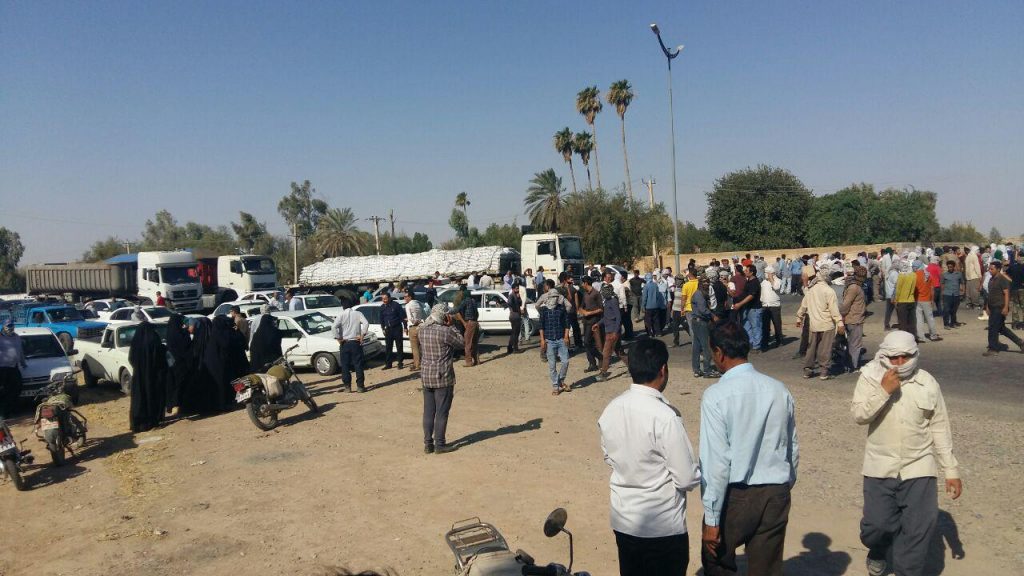Iranian Sugar Plant Workers Detained Without Bail After Protesting Unpaid Wages and Benefits
 Eight workers at one of Iran’s largest and oldest agricultural companies remain detained without bail after being arrested for demanding unpaid wages and benefits.
Eight workers at one of Iran’s largest and oldest agricultural companies remain detained without bail after being arrested for demanding unpaid wages and benefits.
At least 13 workers who had been protesting since mid-July 2017 after not being paid their salaries and insurance allowances by the Haft Tappeh sugarcane company near Shush in Khuzestan Province were detained on July 25 and July 26, according to the Free Workers Union of Iran (FWUI).
“Eight Haft Tappeh workers were arrested at their homes following night raids by security agents on July 25 and five other workers were arrested at the factory this morning,” announced the organization in a statement.
The statement added that five were released on July 27 but eight others remain behind bars: Ahmad Kasir, Behzad Nazari, Hadi Tafah, Abdolreza Sorkheh, two brothers known only by their family name Abdollahzadeh, and two other workers with the family name of Savari.
“The order to arrest the workers was issued by the authorities probably because their protests earlier in the day had disrupted traffic along the Shush-Ahwaz transit way,” reported the state-funded Iranian Labor News Agency (ILNA) on July 26, putting the number of arrests at “about 15.”
Judicial authorities have so far refused to reveal where the detainees are being held and rejected requests to release them on bail, according to FWUI.
The Haft Tappeh Workers Union (HTWU) has called for the immediate release of their colleagues.
“Our colleagues have declared that if wage demands are not met and the workers are not freed from detention, they will resume their protests,” warned the union in its July 25 statement.
The union said workers had not been paid salaries and insurance allowances in April, May and June 2017 and pointed to the privatization of the company as the main source of friction between management and workers.
“Workers strongly object to handing the company to the private sector,” said the statement. “The process has been going on for 15 months and the company has not been fully handed over, but given the obvious and destructive incompetence of the new private managers, there is a real chance that in the end this industry and its workers will face more serious issues.”
“Up to this point, the privatization process has caused job insecurity and constant delays in the payment of workers’ salaries and benefits,” added the statement. “The workers are even being denied the most basic requirements such as uniforms and boots. Also as labor conditions get worse, we have witnessed an increasing presence of police and security forces in the work place.”
The statement continued: “Repressive measures by the police after the closure of the Ahwaz-Andimeshk highway by the workers shows that the authorities are willing to spend millions on security actions but not pay the workers for their basic wages.”
Labor activism in Iran is seen as a national security offense; independent labor unions are not allowed to function, strikers are often fired and risk arrest, and labor leaders are consistently prosecuted under catchall national security charges and sentenced to long prison terms.
Employing more than 2,700 workers, the Haft Tappeh sugarcane company began operations under Iranian government control in 1961. Its current annual sugar production capacity is estimated at 100,000 metric tons.
In March 2016, the announcement of its sale to two private Iranian companies raised concerns among workers about possible job cuts. Since then, delays in salaries and benefit payments have led to a number of arrests of protesting workers.
Six workers were arrested at the plant on April 26, 2017 and summoned to a court in Dezful in Khuzestan Province on charges of “propaganda against the state.” Their cases are pending.
One of the detainees, HTWU board member Ali Nejati, was sentenced by Branch 2 of the Revolutionary Court in Dezful to six months in prison for “propaganda against the state” on May 25. The Center for Human Rights in Iran (CHRI) was unable to independently verify the status of the five other workers.






